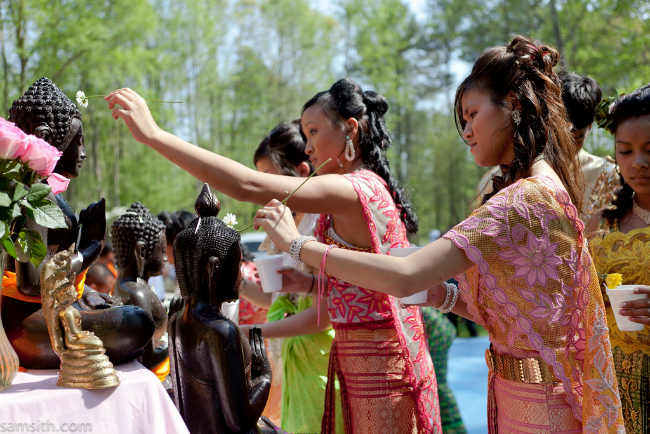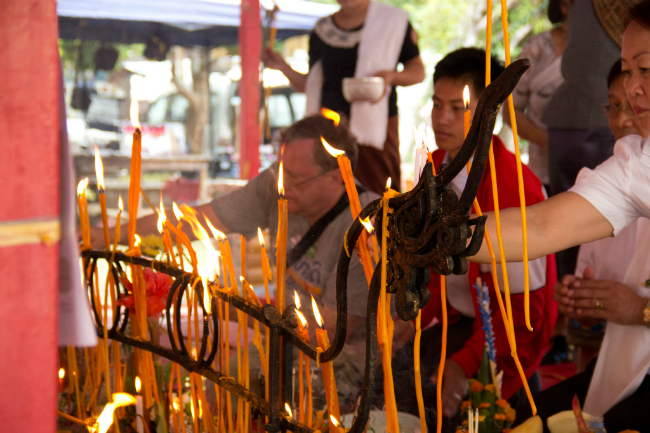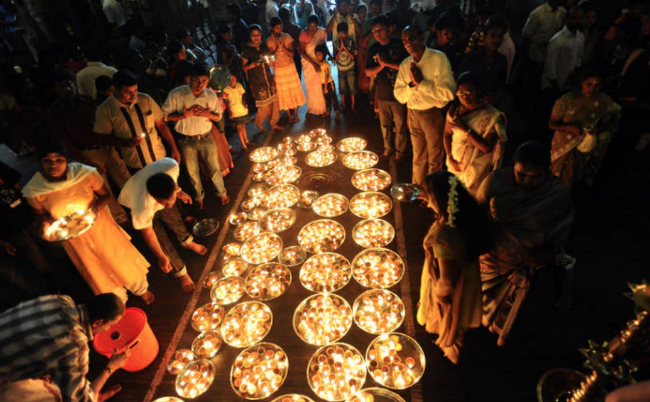Unlike Western world which celebrates New Year on 1st January, a system based on the Gregorian calendar, Southeast Asian New Year is celebrated following the lunisolar calendar system and its events. In modern times it is usually reckoned around 13-14 April, and there is unique celebrations happening all over the region.
Often characterized by the gathering of family, playful water fights in the streets and local games South and Southeast Asian New Year is also a very spiritual occasion with a wide variety of unique rituals held throughout various countries over a period of days.
Thai New Year - Songkran

A flowery shirt and a water gun are all you need for a fun Songkran day
Having it fixed on 13 April every year, Songkran (also known as Water Festival) is one of the most famous festivals in the region, attracting tourists from all over the world to Thailand. Most locals will visit their hometown and spend time with family during the celebrations. A lot of symbolic traditions are still in practice like merit-making, paying reverence to ancestors or visiting local temples and offering food to the monks.
Besides that, a massive nationwide water fight is what this festival is well-known for. Nowhere is safe from water guns and buckets of water. Prepare to get wet!
Burmese New Year - Thingyan

Kids throwing water at each other on Thingyan day
Thingyan is originally from Hindu myth, and in the modern world this is a Buddhist Festival taken over a period of four to five days. A variety of religious activities will be held during the day, followed by feasting and partying in the evening.
Similar to Songkran in Thailand, Thingyan in Myanmar is also a water festival where water is poured from silver vessels, sprayed from water pistols, hurled from buckets to wash away the old year and cleanse sins from the past year.
Khmer New Year - Choul Chnam Thmey

Cleansing Buddha statuses is common practice during Khmer New Year
Based on the Buddhist calendar, Khmer (Cambodia) New Year normally falls on the 13th or 14th of April and officially lasts for 3 days, although typically celebrations also spill out into surrounding days. Each day has its special celebration and traditions. Cleaning houses, visiting temples, bathing Buddha statuses and offering food to monks are common practices for the New Year.
Water fights and traditional games are once more also important parts of the celebration. If you are in Cambodia during this time of the year, it is a great chance to visit temples (even during the evening!), and join locals in music and dance.
Lao New Year - Pi Mai

Ritual washing of the Praman Buddha image in Luang Prabang, Laos.
Celebrated at the hottest time of the year in Laos, Pi Mai could last a full week with a lot of water & flour throwing and cultural activities. Pretty much similar in traditions like its neighbors Cambodia and Thailand, Lao start their New Year by cleaning houses & villages, bathing Buddha statuses with holy water and decorating them with flowers.
In big cities like Luang Prabang and Vientiane, Grand parades and beauty pageants followed by music and dance are the famous activities of the festival and not-to-be-missed if you are there.
Sri Lankan New Year - Aluth Avurudda

Sri Lankans praying in a religious ceremony during Sinhalese New Year.
Originally a Sri Lankan holiday to celebrate the New Year of Sinhalese people in Sri Lanka, it is now a major holiday celebrated by most Sri Lankans. The timing of Aluth Avurudda coincides with the time of new year celebrations in many Southeast Asian countries which fall on the 13th or 14th of April.
Traditionally homes are being cleaned, even repainted, and celebratory food is prepared in advance of the New Year. Sri Lankans mark the beginning of a New Year with a peculiar ritual. Diary or coconut milk is brought to a boil and its overflow is auspicious of prosperity and wealth coming in the new year. Once the important rituals are taken care of, the parties begin, with families mingling in the streets, enjoying traditional dishes, and children playing.


 By Jin Posted 12th Apr 2018
By Jin Posted 12th Apr 2018







